
IN THE BAD OLD DAYS, soldiers used to line up and face the enemy, expecting to be attacked man to man, on foot, or with horses, and later, to mow each other down with machine guns. The soldiers were maimed, bled and died by their thousands on behalf of civilians.
World War 2 changed that as it was the first major war where more civilians died than soldiers. This continues today - at risk of stirring up a hornets' nest - I reckon that the Israel-Hamas war is primarily a massive public relations stunt by Hamas to make their citizens unwilling martyrs and make Israel a pariah. At time of writing (8 April 2024), wiki says that over 34,000 civilians (33,091 Palestinian and 1,410 Israelis) have been killed. In stark contrast, Hamas claims to have lost 6,000 'fighters' while the IDF claims up to 12,000 Hamas combatants killed. The point is, civilian casualties are three to six times higher than soldiers.
The reason I venture into this minefield is that I recently watched the Oppenheimer movie, and am sporadically watching the Netflix series, Masters of the Air, which is a semi-serious attempt to dramatize USAAF B-17 bomber crews who, contrary to claims, indulged in area, and not precision, bombing. Only the leader aimed his bombs, the others released theirs when they saw the leader's bombs drop.
The Oppenheimer movie is about Dr Robert Oppenheimer, who headed the Manhattan project, whose two atomic bombs killed 129,000 -200,000 civilians - and 'just' 10,000 soldiers. The atomic bombs had the desired effect because the cost in human life was just too much, even for the Japanese Emperor.
Which raises the question of whether bombing with conventional high explosive bombs was ever really a useful strategy in the WW2. Hundreds of thousands of civilians died on the ground in horrors such as the RAF's Dreden firestorm and the USAAF's Operation Meetinghouse Tokyo raid.
Morale Bombing
This story is from the June 2024 edition of SA Flyer Magazine.
Start your 7-day Magzter GOLD free trial to access thousands of curated premium stories, and 9,000+ magazines and newspapers.
Already a subscriber ? Sign In
This story is from the June 2024 edition of SA Flyer Magazine.
Start your 7-day Magzter GOLD free trial to access thousands of curated premium stories, and 9,000+ magazines and newspapers.
Already a subscriber? Sign In
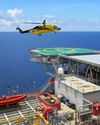
LIVING THE DREAM Part 2: Planning and Pax
Part 2: Planning and Pax
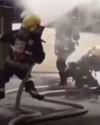
QUEEN AIR TALES
In the early seventies Esquire Airways acquired a pre-owned Beechcraft Queen Air. This top of the range 8,800 lb MAUW model had nine forward facing commuter seats and I flew it as a single pilot operation for several months.

HELICOPTER PILOTS SHOULD UNIONISE
Helicopter pilots are stuck in a 12-month flying cycle. While they will have periods of rest and active rest (performing ground-based tasks and planning ventures) within their work source campaigns, it's not a good situation. They need programmed periods to catch their breath.
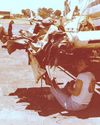
AFTERMATH of the Engine Fire
Iris McCallum continues her stories about her early years with Air Kenya. This month she tells us about the immediate aftermath of her dramatic engine fire and crash, and her subsequent 'getting back onto the saddle'.
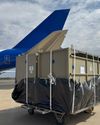
LARGEST EVER RHINO RELOCATION
Specialist air cargo operator ACS mobilised all its skills to successfully complete a very challenging project – the translocation of 39 White Rhino from Namibia to the USA.
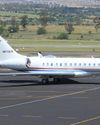
NOVEMBER 2024
November sees strong growth in aircraft registrations with 16 additions, but 10 aircraft are cancelled as exported. The Type Certified additions are a mixed bag.
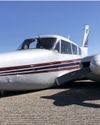
TWINCO FUEL
AIRCRAFT ACCIDENT REPORT
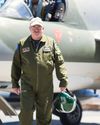
RON WHEELDON'S HUNTERS
RON WHEELDON is a Johannesburg based trademark and IP attorney. He writes, \"My love affair with Hawker Hunter jet fighters started in approximately 1963 when the Rhodesian parliament opening was marked by a fly-by of nine recently acquired Hawker Hunters in diamond formation.
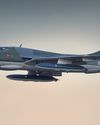
FLYING THE HAWKER HUNTER
Flying a Hunter starts hours before actually walking out to the aircraft. This machine is a legend, but it is first of all about the highest performance machine that it is feasible for a civilian to fly. Flying it is not to be taken lightly.

RIGHT SEAT RULES NO. 25 SLOW FLIGHT
Most of us feel a bit edgy when the ASI creeps down within 10 KIAS of the stall. Jim Davis has some hints on how to be comfortable and in control - even when the airspeed is 20 KIAS below the stall.